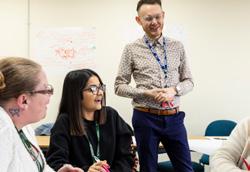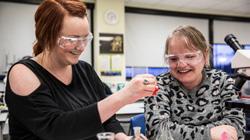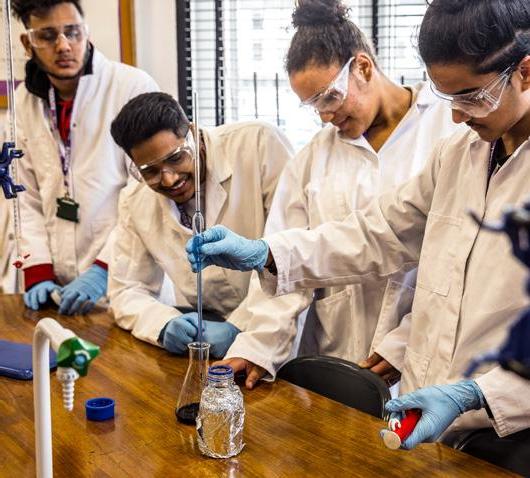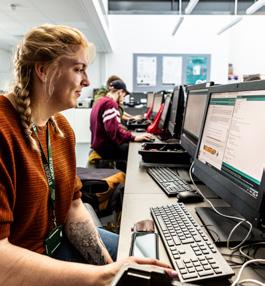
7 minute read
Access to University
Staci Access to Higher Education (Health & Applied Science)
I like that the course gives you a real insight into what university will be like, in terms of the standard of work and workload. This is particularly important for people like me who have been out of education for a long time. In lessons we learn about the NHS and the Nursing & Midwifery Council, as well as everything to do with the human body, which I find really interesting. After College I am going to the University of Northampton to study an undergraduate Midwifery course for three years.
If you are aged 18 or over without the standard qualifications to enter higher education, these one-year, intensive courses are ideal for you.
Our Access courses build the skills, knowledge and confidence you need to progress on to higher education in the subject area you’re interested in. They are recognised by universities across the UK and allow entry on to higher education courses in your chosen specialist area. You will gain a good introduction to your chosen subject, develop your study skills and increase your confidence and ability with this level of study. The course takes one year and, on completion, you will gain an Access to Higher Education Diploma. All pathways will include compulsory English & maths, as well as research skills units. You will also need to have good IT skills as all of your assignments will be carried out using either Word, Excel or PowerPoint. You can undertake IT Skills classes at our Learning Centre, if needed.
Financial Help
If you are aged 19 or over, you may qualify for an Advanced Learner Loan to help you pay the tuition fees for this course. Alternatively, you can pay by instalments to help make the cost more affordable. Find out more about your payment options on our website. If you complete one of our Access to Higher Education courses and use an Advanced Learner Loan to pay for your tuition fees, the Student Loans Company will write off the balance on the Advanced Learner Loan if you then go on to complete an undergraduate course. *Terms & Conditions apply; visit our website to find out more.
How to apply
If you’re 18 years old or older you may apply and will need to have English Language and maths GCSE at grade 4/C or above, or equivalent Level 2 qualifications, before the start of the course. Entry will also be subject to a successful interview. Successful applicants will be in College for three days per week and will also have to undertake a relevant work placement for up to 150 hours (which is a requirement of some courses). A work placement officer may be able to support you in finding suitable places. You may also have to complete a DBS check.


(Based at Shuttleworth College)
Typical units covered:
• Animal Behaviour • Animal Health & Welfare • Animal Management • Animal Nutrition • Animal Science • Conservation • Inheritance, Evolution & Ecology • Principles of Biology
BUSINESS STUDIES
Typical units covered:
• Business Financial Accounting • Business Management Accounting • Business Recruitment and Retention • Developing a Business Plan • Financial Planning in Business • Introduction to Microeconomics • Managing Human Resources for Business • Marketing Principles and Implications for Business • Business Communication • Persuasion and change in a Business/media context
COMBINED SCIENCE
Typical units covered:
• Biomolecules (Biochemistry) • Blood, Circulation and Breathing • Cells, Tissues and Organs • Chemistry Foundations • Drugs and Food Additives • Energy • Evolution and Ecology • Digestion and the Liver • Homeostasis • Mendelian and Applied Genetics • Microbiology • Periodic Table • Structure and Bonding
What could I do next?
You could progress on to our Animal Management Foundation Degree (FdSc) or study a range of degrees such as Animal Science, Biology, Veterinary or Zoology at other universities.

What could I do next?
You could progress on to our Business BTEC HNC/HND. You could also go on to study Events Management, Fashion Management or Economics at University.

What could I do next?
After this study programme you could go on to study Biomedical Science, Sport Conditioning, Rehabilitation & Massage or Food Science & Nutrition at University.

Typical units covered:
• Computer Architecture • Computer Networks and Data Communications • Data Representation for IT • Designing and Building an IT Software Solution • Designing and Building a Multi-Page Website • Impact of IT Systems on Society • IT Business Solutions • IT System Security • Operating Systems and Systems Tools
ENGINEERING
Typical units covered:
• Computer Aided Engineering for Engineers • Engineering Design • Engineering Materials • Engineering Project • Electronic Science for Engineers • Further Mathematics for Engineers • Manufacturing Processes in Engineering • Mathematics for Engineers • Mechanical Science for Engineers
Typical units covered:
• Introduction to Sociology • Historical Controversy • The individual in History • History Conflict and Combat • Short Fiction • Creative Writing • The Sociology of Family • The sociology of Crime and Deviance • Youth Crime
What could I do next?
You could progress on to our Computing HNC/HND or study a range of degrees such as Computer Sciences, Computer Networking, Computer Graphics & Visualisations, Software Engineering, Programming Language Theory, Computer Security and Forensics and much more at other universities.

What could I do next?
You could progress on to our Electrical & Electronic or Mechanical Engineering BTEC HNC/HND, or you could go on to study a degree in Construction, Estimating & Planning, Construction Equipment, Civil Engineering, Mechanical or

HUMANITIES AND SOCIAL SCIENCE
Electrical Systems at other universities.
What could I do next?
After this course you could go onto University to study a range of subjects including English Literature, Sociology or Criminology. You could also go into a career in Legal Professions, Media and Journalism or Social Work.

Typical units covered: What could I do next?
• Blood Circulation You could progress onto further study in areas such as • Cells, Tissues and Organs Past Biomedical Science, Midwifery, Mental Health • Digestion and the Liver Nursing or Psychology at University. • Disease and Body Defence • Drugs and Food Additives • Healthcare within the NHS • Homeostasis • Mendelian and Applied Genetics • Introduction to Psychology • Introduction to Sociology • Reproductive Biology • Understanding Mental Health Difficulties • Sociology of Health

PSYCHOLOGY
Typical units covered:
• Neuro-Psychology • Child Development • Cognitive Psychology • Criminal Psychology • Cyber Psychology • Forensic Psychology • Introduction to Psychology • Introduction to Sociology • Psychology of Education • Sociology of Crime and Deviance • Social Psychology • Understanding Mental Health
Did you know?
Studying an Access to Higher Education course with us will get you on your way to obtaining a full degree at university.
Don’t forget!
If you take out an Advanced Learner Loan to cover your tuition fee and then go on to complete a higher education qualification after your Access course, any remaining loan amount will be written off! *Terms and Conditions apply; please visit our website to find out more.
What could I do next?
You could progress on to our Psychology & Crime Foundation Degree (FdSc) or study a degree in a range of psychological fields such as Clinical Psychology, Health Psychology, Counselling Psychology, Legal Psychology,

Social Psychology or Forensic Psychology.

SOCIAL SCIENCES & SOCIAL WORK
Typical units covered:
• Social Work Practice • Crime and Deviance • Mental Illness and Society • Psychology • Cognitive Psychology • Social Psychology • Social Policy • Sociology • Sociology of the Family • Sociology of Mass Media TEACHER EDUCATION
Typical units covered:
• Chemistry • English • English Literature • Human Biology • Mathematics • Practical Science • Research Skills • School-based Experience; Education, Curriculum and Early Learning 10 week placement (placement not based at College) • Science for Teachers
What could I do next?
After this course you could go on to further study in areas such as Psychology, Government & Economics,

Social Work or Criminology with Psychology at University.
What could I do next?
You could progress on to our Educational Practice Foundation Degree (FdSc). You could also go onto University to study a courses including Education Studies & English, Primary Teacher Education and Childhood & Youth Studies. Please visit our website for more information on work-shadowing requirements.

Access courses are widely recognised by UK universities for entry on to undergraduate courses. Last year, over 20,000 Access students achieved their Diploma and progressed to university courses across the UK.1
Source: www.accesstohe.ac.uk
Find out more about our Access to Higher Education courses by visiting our website









